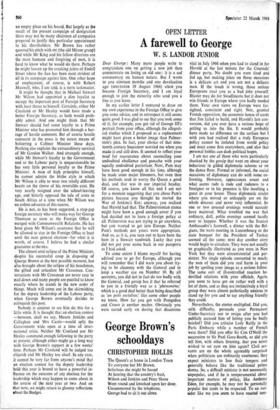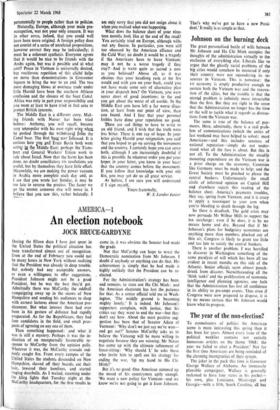A farewell to George
OPEN LETTER W. S. LAND OR JUNIOR
Dear George : Many more people write to congratulate one on getting a new job than commiserate on losing an old one: it is a sad commentary on human nature. But I wrote to you nineteen months and one devaluation ago (SPECTATOR 19 August 1966) when you became Foreign Secretary, and I am loyal enough to join the minority who send you a line as you leave.
In my earlier letter I ventured to draw on my own experience in the Foreign Office to give you some advice, and in retrospect it still seems quite good. I was glad to see that you took some of it; for example, you got rid of George IH's portrait from your office, although the allegori- cal studies which I proposed as a replacement might have given a better image than Palmer- ston's phiz. In fact, your choice of that nine- teenth century buccaneer worried me when you made it and still does. It seemed to reflect your need for reassurance about reconciling your undoubted ebullience and panache with your equally undoubted patriotism. Now, Pam may have been good enough in his time, although he made some major bloomers, but even then his methods used to worry the Queen a good deal, and that was in our imperial heyday.
Of course, you know all this and I am not for a moment suggesting that you chose Pam's picture because you thought he started the War of Jenkins's Ear; anyway, you realised that Harold had that. The Palmerstonian stance might have been a good enough cover if you had decided not to have a foreign policy at all. Palmerston was not trying to go anywhere, but you wanted to get into Europe. Neither Pam's methods nor yours were appropriate. And so, as it is, you turn out to have been the ham in a Stewart sandwich. Lucky that you did not put your name back in our passports as I had asked. .
To some extent I blame myself for having advised you to go for Europe, although you will remember that I did warn you about try- ing to be chummy with the General and to keep a weather eye on Number 10. By all accounts, you did not in fact do too badly with the General, and gossip has it that he referred to you in a friendly way as a 'phinomene,' which is a good deal better than being described as 'un petit socialiste,' like some other people we know. How far you got with Pompidou and Couve is another matter. Obviously you were carted early on during that disastrous visit in July 1966 when you had to stand in for Harold at the last minute for the Courcels' dinner party. No doubt you were tired and fed up, but making jokes on those occasions is a delicate art and you are not a delicate man. If the touch is wrong, those serious Europeans treat you as a bad joke yourself.
Bluster may do for Swadlincote but it does not win friends in Europe where you badly needed .them. Your own views on Europe were far- sighted, consistent and right. Nor, granted French opposition, the economic house of cards that Jim failed to build, and Harold's late con- version, did you ever have a serious hope of getting us into the Six. It would probably hive made no difference on the surface but I wish you had realised that a truly European policy cannot be liolated from world policy and must come first everyivhere; and also that personal foibles can dash political hopes.
I am not one of those who were particularly shocked by the gossip that went on about your behaviour in gilded diplomatic saloons or on the dance floor. Formal or informal, the social Occasions of diplomacy can do with some en- livening. However, appearances count and -what seems rude is rude and rudeness to a foreigner or in his presence is like insulting a guest in your house. Those diplomatic circles where you moved so unhappily are on the whole discreet and never very influentiaL So one or two unusual evenings would scarcely have mattered. What troubled me was that ordinary, dull, polite evenings seemed hardly ever to happen. Whether it was the Iranian Ambassador's farewell, a dinner with the Bel- gians, the NATO meeting in Luxembourg or the state banquet for the President of Turkey seemed all the same; next day another story would begin to circulate. They were not usually so graphically illustrated as you were in New York but they were circumstantial and per- sistent No single episode amounted to much; the sum of them did you real harm M your job by spoiling your image as a serious fellow. The same sort of ill-controlled reaction be- devilled relations with your officials. Again, you seem to have got on rather well with a lot of them, and as they are instinctively a loyal group they were almost pathetically anxious to stand up for you and to say anything friendly they could.
Nevertheless, the stories multiplied: Did you, with difficulty, persuade your Permanent Under-Secretary not to resign after you had publicly accused him of letting you be1 badly briefed? Did you criticise Lady Reilly in the Paris Embassy while a number of French were there? Did you offer Sir Con O'Neill the succession to Sir Paul Gore-Booth, or did you tell him, with others listening, that you never wished to set eyes on him again? Civil ser- vants are on the whole agreeably surprised when politicians are ordinarily courteous; they expect ministers to lose their tempers and generally behave like the traditional prima donna. So, a difficult minister is not necessarily unpopular, and if he is temperamental about important matters of policy, like Anthony Eden, for example, he may not be personally popular but tends to be respected. To an out- sider like me you seem to have reacted tern-
peramentally to people rather than to policies.
Naturally, Europe, although your main pre- occupation, was not your only concern. It was in other areas, indeed, that you could well have been more original. A foreign policy does not consist of a series of unrelated propositions, however correct they may be individually; it must be a coherent synthesis. Everyone agrees that it would be nice to be friends with the Arabs again, but was it possible and at what cost? Peace in Vietnam is universally desired, but vociferous repetition of this cliché helps no more than demonstrations in Grosvenor Square to bring the war to an end. The two most damaging blows at overseas trade under little Harold have been the southern African confusion and the closure of the Suez CanaL Africa was only in part your responsibility and you seem at least to have tried in that area to protect British interests.
The Middle East is a different story. Mak- ing friends with Nasser has been tried before: Anthony, you will recall, became very unpopular with his own right wine when, he pushed through the withdrawal from the Canal base. The first Suez war 'followed. It is curious how yeu and Ernie Bevin both went astrky in-the Middle East; perhaps the Trans- port and General Workers' Union work to rule about IsraeL Now that the harm has been done, no doubt conciliatory UN resolutions are useful, but by themselves they have little effect. Meanwhile, we are making the power vacuum in Arabia more complete each day and, as I see that you wrote last Sunday, it may be too late to reverse the proCess. The faster we go the sooner someone else will move in. I believe that you saw this, rather belatedly. I
am only sorry that you did not resign about it when you realised what was happening.
What does the balance sheet of your nine- teen months look like at the end of the road? You certainly tried on Europe, although with- out any finesse. In particular, you were still too obsessed by the American affiance and the Cold War; no doubt it would be a tragedy if the Americans have to leave Vietnam; may it not be a worse tragedy if they stay?-- And is NATO quite as sacred a cow as you believed? Above all, as it was obvious that your headlong rush at the Six would end with you on your back, could you not have made some sort of alternative plan in your dispatch box? On Vietnam, you were never short of good intentions; in the end you got about the worst of all worlds. In the Middle East you have left a far worse situa- tion, at least from our point of view, than you found. And I fear that your personal foibles have done your reputation no good.
These are sad things to have to write to an old friend, and I wish that the truth were less bitter. There is one ray of hope. In your letter giving Harold your resignation, you said that you hoped to go on serving the movement and the country. I certainly hope you can serve both, although I am increasingly doubtful if this is possible. In whatever order you put your hopes in your letter, you know in your heart that the country comes before the movement. If you follow that knowledge with your old fire, you may yet do us all great service.
As before, I am sure you will understand if I sign myself, Yours fraternally,
W. S. Landor Junior







































 Previous page
Previous page